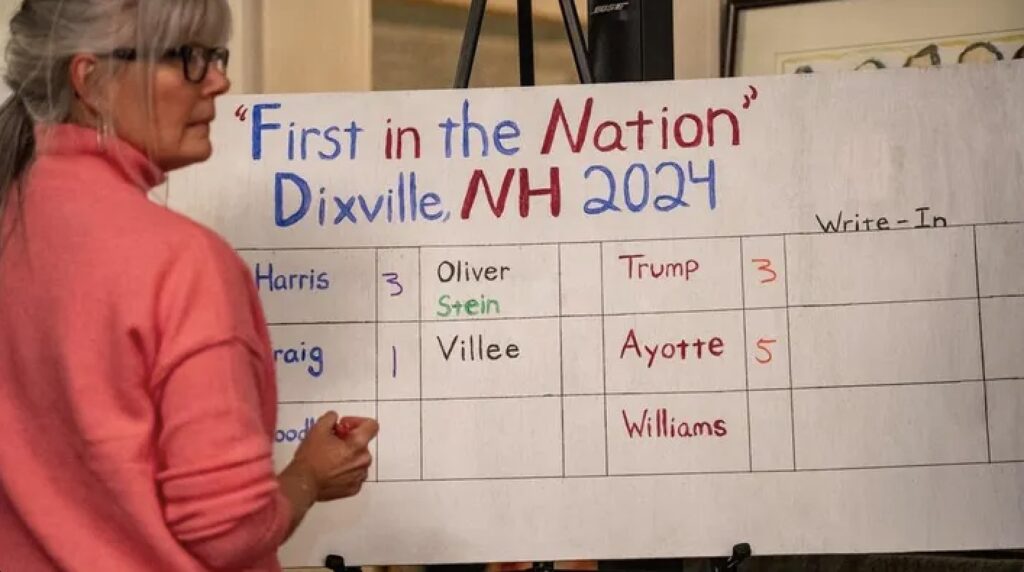In the early hours of November 5, 2024, the small town of Dixville Notch, New Hampshire, made headlines as the first to cast and count ballots in the U.S. general election. This quaint tradition, now spanning over six decades, saw six registered voters participate in the electoral process. In a surprising twist, the results revealed a tie between former President Donald Trump and Vice President Kamala Harris, with each receiving three votes. This outcome was especially notable given the town’s previous preference in the 2020 election, when Joe Biden won decisively with a 5-0 vote, and Hillary Clinton’s victory in 2016 that saw a more significant lead of 4-2 over Trump.
Dixville Notch’s unique voting tradition, which began during the 1960 presidential election, has garnered interest from both local and international observers. On this year’s election night, a gathering of political enthusiasts and media representatives flocked to the town, creating an atmosphere buzzing with anticipation and camaraderie. Four registered Republicans and two unenrolled voters made up the electorate, with excitement in the air. Among the attendees were two dogs, Max and Lucy, adding a whimsically lighthearted touch to the event. The town’s small yet vibrant community fostered an environment where both local residents and journalists from places as far as Hong Kong found common ground in their curiosity about the unfolding electoral drama.
Interestingly, while all six residents of Dixville Notch had previously expressed support for Republican candidate Nikki Haley during the New Hampshire primary, their decision-making process for the general election revealed complexities. Despite their backing for Haley, the motivation behind their final votes laid in the growing intrigue surrounding the election landscape. This situation sparked discussions among experts and analysts, who pondered the factors influencing voter sentiment. The outcomes in Dixville Notch were seen as significant markers of larger voting trends, particularly considering how such a small population could foreshadow more extensive electoral behavior in upcoming contests.
The results of this historic vote not only caught the attention of political analysts but also raised eyebrows among those watching the electoral trends in New Hampshire and beyond. Trump’s return to receiving votes in Dixville Notch after previously being overlooked in 2020—and after failing to win any votes in the 2024 New Hampshire primary—suggests a shift in voter sentiment within this small community. Some political commentators noted that this electoral pivot could signal broader changes in the Republican voter base in the lead-up to the election, challenging previously established notions of loyalty to candidates in a rapidly evolving political landscape.
The significance of Dixville Notch’s voting, particularly its influence on national discourse, is palpable. As political pundits dissect the implications of this tied vote between Trump and Harris, the event itself serves as a captivating narrative in the broader story of the 2024 election. With the town’s consistent history of being an early bellwether for electoral outcomes, discussions around this tie reflect a wider uncertainty in the electorate. It underscores a compelling juxtaposition of traditional voting patterns and emerging new sentiments among voters, and merits further analysis into how these local events can inform national trends.
In conclusion, the midnight voting tradition in Dixville Notch remains a meaningful aspect of American electoral culture. The surprising results, with Trump and Harris locking in a tie, challenge previous electoral expectations and prompt renewed conversations about voter preferences. The blend of local participation and national attention speaks to the power of small communities in shaping the larger electoral narrative. As the nation watches the unfolding election results throughout the day, Dixville Notch stands as a reminder of how every vote matters and how every small community plays a role in the broader democratic process.

